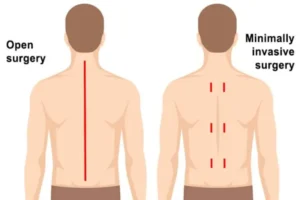Back pain is one of the most common health complaints worldwide, affecting millions of people every year. While many cases can be managed with non-surgical treatments such as physical therapy or medications, some conditions require surgical intervention. For those who need surgery, minimally invasive spine surgery (MISS) offers a modern, less disruptive option compared to traditional open surgery.
What Is Minimally Invasive Spine Surgery?
Minimally invasive spine surgery is a technique that uses small incisions, specialized instruments, and advanced imaging technology to treat spinal conditions. Unlike traditional open surgery, which requires a large incision and significant muscle dissection, MISS minimizes tissue damage, leading to quicker recovery and reduced risk of complications.
Conditions Treated with MISS
Minimally invasive techniques are used to address a variety of spinal conditions, including:
- Herniated Discs: When the soft cushion between spinal vertebrae bulges or ruptures, causing pain and nerve compression.
- Spinal Stenosis: Narrowing of the spinal canal that puts pressure on nerves.
- Degenerative Disc Disease: Wear and tear on spinal discs causing pain or instability.
- Scoliosis and Other Spinal Deformities: Correcting abnormal curvature of the spine.
- Spinal Fractures: Often caused by trauma or osteoporosis.
- Spinal Tumors: Removal of abnormal growths that compress nerves or the spinal cord.
Benefits of Minimally Invasive Spine Surgery
MISS offers several advantages over traditional open surgery:
- Smaller Incisions: Typically 1-2 inches, reducing scarring.
- Less Muscle Damage: Muscle-sparing techniques preserve strength and function.
- Reduced Blood Loss: Smaller incisions mean less bleeding during surgery.
- Shorter Hospital Stay: Many procedures are outpatient or require only an overnight stay.
- Faster Recovery: Most patients return to normal activities more quickly than with open surgery.
- Lower Risk of Infection: Smaller wounds reduce the likelihood of infection.
How MISS Works
MISS relies on advanced tools and techniques, including:
- Endoscopy: A tiny camera inserted through a small incision provides a clear view of the surgical area.
- Fluoroscopy: Real-time X-ray imaging guides the surgeon with precision.
- Specialized Instruments: Designed for small spaces, these tools allow surgeons to work through minimal incisions.
- Robotic Assistance: In some cases, robotic systems improve accuracy and reduce surgeon fatigue.
Types of Minimally Invasive Spine Procedures
Here are some common MISS procedures:
- Discectomy: Removal of herniated disc material pressing on nerves.
- Laminectomy: Removal of part of the vertebra to relieve pressure on the spinal cord or nerves.
- Spinal Fusion: Stabilizing the spine by joining two or more vertebrae.
- Kyphoplasty/Vertebroplasty: Stabilizing spinal fractures with bone cement.
- Artificial Disc Replacement: Replacing a damaged disc with a prosthetic one.
Is MISS Right for You?
While MISS offers many benefits, it’s not suitable for every patient or condition. Factors that may influence your eligibility include:
- Severity of Condition: Complex cases may still require traditional surgery.
- Previous Surgeries: Scar tissue from past procedures can make MISS more challenging.
- Overall Health: Patients with certain health issues may need special considerations.
Consulting with a spine specialist is essential to determine whether minimally invasive surgery is the best option for your needs.
Recovery and Rehabilitation
Recovery from MISS is often quicker and less painful compared to open surgery, but it still requires effort and care:
- Pain Management: Prescription or over-the-counter medications can help manage post-surgical pain.
- Physical Therapy: Strengthening and stretching exercises promote healing and prevent future issues.
- Activity Restrictions: Avoid heavy lifting or strenuous activities until cleared by your surgeon.
- Follow-Up Appointments: Regular check-ins ensure proper healing and address any concerns.
Final Thoughts
Minimally invasive spine surgery is transforming the way spinal conditions are treated, offering patients a safer, less painful, and faster path to recovery. If you’re dealing with chronic back pain or other spinal issues, consulting a qualified spine specialist can help you explore your treatment options and determine if MISS is right for you. With the right care, you can get back to living your life pain-free.

